-
 Bitcoin
Bitcoin $106,754.6083
1.33% -
 Ethereum
Ethereum $2,625.8249
3.80% -
 Tether USDt
Tether USDt $1.0001
-0.03% -
 XRP
XRP $2.1891
1.67% -
 BNB
BNB $654.5220
0.66% -
 Solana
Solana $156.9428
7.28% -
 USDC
USDC $0.9998
0.00% -
 Dogecoin
Dogecoin $0.1780
1.14% -
 TRON
TRON $0.2706
-0.16% -
 Cardano
Cardano $0.6470
2.77% -
 Hyperliquid
Hyperliquid $44.6467
10.24% -
 Sui
Sui $3.1128
3.86% -
 Bitcoin Cash
Bitcoin Cash $455.7646
3.00% -
 Chainlink
Chainlink $13.6858
4.08% -
 UNUS SED LEO
UNUS SED LEO $9.2682
0.21% -
 Avalanche
Avalanche $19.7433
3.79% -
 Stellar
Stellar $0.2616
1.64% -
 Toncoin
Toncoin $3.0222
2.19% -
 Shiba Inu
Shiba Inu $0.0...01220
1.49% -
 Hedera
Hedera $0.1580
2.75% -
 Litecoin
Litecoin $87.4964
2.29% -
 Polkadot
Polkadot $3.8958
3.05% -
 Ethena USDe
Ethena USDe $1.0000
-0.04% -
 Monero
Monero $317.2263
0.26% -
 Bitget Token
Bitget Token $4.5985
1.68% -
 Dai
Dai $0.9999
0.00% -
 Pepe
Pepe $0.0...01140
2.44% -
 Uniswap
Uniswap $7.6065
5.29% -
 Pi
Pi $0.6042
-2.00% -
 Aave
Aave $289.6343
6.02%
how to sell bitcoin on binance in nigeria
Selling Bitcoin on Binance in Nigeria requires verification, understanding fees & tax implications, and prioritizing security (like 2FA). Binance offers various Naira withdrawal methods, but navigating the platform may initially require learning its features.
Mar 26, 2025 at 12:56 am
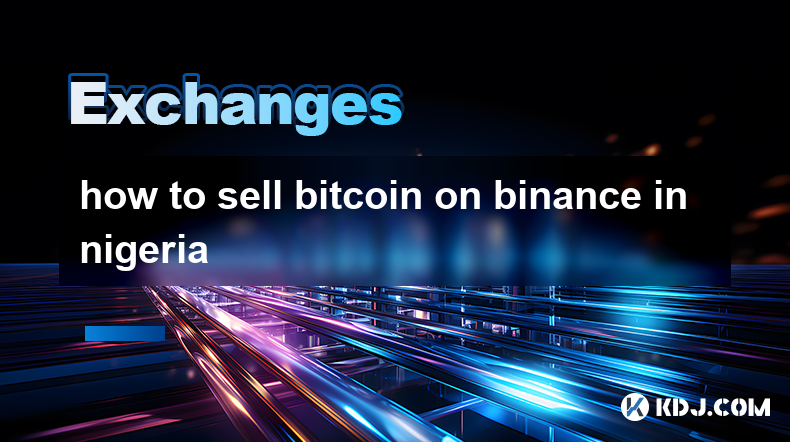
Key Points:
- Verification and KYC/AML compliance are crucial for selling Bitcoin on Binance in Nigeria.
- Binance supports various payment methods for Naira (NGN) withdrawals, offering flexibility to Nigerian users.
- Understanding trading fees and potential tax implications is vital for maximizing profits.
- Security best practices, including two-factor authentication (2FA), are essential to protect your Bitcoin and account.
- Navigating Binance's interface may require some initial learning, but resources are available.
How to Sell Bitcoin on Binance in Nigeria
Selling Bitcoin on Binance in Nigeria involves several steps, requiring careful attention to detail and security. First, you must have a verified Binance account. This necessitates providing personal information and undergoing Know Your Customer (KYC) and Anti-Money Laundering (AML) checks, which are standard procedures to comply with international regulations. These checks are designed to prevent illicit activities and protect the integrity of the platform. Failure to complete verification will severely limit your trading options.
Next, you need to fund your Binance account with Bitcoin. This involves transferring your Bitcoin from your existing wallet to your Binance Bitcoin wallet address. Ensure you double-check the address to avoid irreversible loss of funds. Binance provides clear instructions on how to deposit cryptocurrencies, usually involving a QR code or a manual address entry. Remember to factor in network fees when transferring your Bitcoin.
Once your Bitcoin is in your Binance account, you can initiate the sale. Navigate to the "Trade" section of the Binance website or app. Choose the trading pair you want to use; in this case, it will likely be BTC/NGN (Bitcoin/Nigerian Naira). This indicates you're trading Bitcoin for Naira. Binance offers different trading interfaces, from basic to advanced, catering to varying levels of trading experience.
You'll then need to choose your selling method. Binance offers several options, including limit orders and market orders. A limit order allows you to specify the price at which you want to sell your Bitcoin. A market order executes the sale immediately at the current market price. The choice depends on your risk tolerance and market outlook.
After placing your order, Binance will match it with a buyer. Once the trade is completed, your Naira will be credited to your Binance account. You can then withdraw your Naira to your Nigerian bank account. Binance supports various withdrawal methods for Naira, but verify the available options and associated fees beforehand. Remember to double-check the bank account details before initiating the withdrawal to prevent errors.
Security is paramount throughout this process. Enable two-factor authentication (2FA) on your Binance account for an extra layer of security. This adds an additional verification step beyond your password, making it significantly harder for unauthorized access. Be wary of phishing scams and only access Binance through official channels. Never share your login details or private keys with anyone.
Understanding fees is crucial. Binance charges trading fees on each transaction. These fees vary depending on the trading volume and the type of order placed. Familiarize yourself with the fee structure to accurately calculate your potential profits. Also, be aware of any potential tax implications in Nigeria related to cryptocurrency trading. Consult with a tax professional for advice on tax compliance.
Navigating Binance can seem complex initially. However, Binance provides extensive documentation and tutorials to assist users. Take advantage of these resources to familiarize yourself with the platform's features and functionalities. Starting with smaller trades can be a good way to gain confidence and experience before undertaking larger transactions. Remember that practicing with test funds in a demo account can be very helpful.
Frequently Asked Questions:
Q: What payment methods does Binance support for Naira withdrawals in Nigeria? A: Binance supports various payment methods for Naira withdrawals in Nigeria, which can include bank transfers and potentially other methods depending on availability and local regulations. Check the Binance website for the most up-to-date list of supported options.
Q: Are there any fees associated with selling Bitcoin on Binance in Nigeria? A: Yes, Binance charges trading fees on each transaction, and there may also be withdrawal fees depending on the chosen method. These fees vary, so check the Binance fee schedule before selling your Bitcoin.
Q: How long does it take to sell Bitcoin and receive Naira in my bank account? A: The time it takes to receive Naira in your bank account after selling Bitcoin on Binance varies depending on the chosen withdrawal method and the processing times of both Binance and your bank. It could range from a few minutes to several business days.
Q: Is it safe to sell Bitcoin on Binance? A: Binance is a large and well-established cryptocurrency exchange, but like any online platform, it carries inherent risks. Implementing strong security measures, such as 2FA and using a secure password, is crucial to mitigate these risks. Always be vigilant against phishing attempts.
Q: What if I encounter problems selling my Bitcoin on Binance? A: Binance provides customer support channels through their website and app. You can usually find FAQs and contact information for assistance with any issues you encounter during the selling process.
Q: Do I need to pay taxes on profits from selling Bitcoin in Nigeria? A: The tax implications of cryptocurrency trading in Nigeria are still evolving. It is advisable to consult a tax professional to understand your obligations and ensure compliance with Nigerian tax laws.
Disclaimer:info@kdj.com
The information provided is not trading advice. kdj.com does not assume any responsibility for any investments made based on the information provided in this article. Cryptocurrencies are highly volatile and it is highly recommended that you invest with caution after thorough research!
If you believe that the content used on this website infringes your copyright, please contact us immediately (info@kdj.com) and we will delete it promptly.
- Ruvi AI: The Next Binance Coin with Low Entry?
- 2025-06-19 06:25:13
- IP, Profits, Hype Fading: What's Next for Crypto?
- 2025-06-19 06:25:13
- Shiba Inu Who? Ruvi AI's Audited Token is the Real MVP
- 2025-06-19 06:45:13
- Litecoin's Hidden Setup: Is a 40% Rally Imminent?
- 2025-06-19 06:45:13
- Cryptos, Arctic Pablo & Deflationary Strategy: The Meme Coin Revolution
- 2025-06-19 07:05:13
- Cardano Price Prediction: Is Now the Time to Buy ADA?
- 2025-06-19 07:05:13
Related knowledge
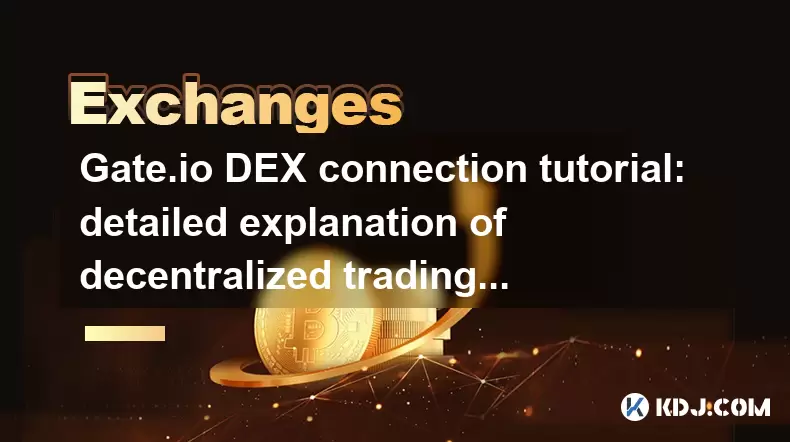
Gate.io DEX connection tutorial: detailed explanation of decentralized trading operation steps
Jun 12,2025 at 08:04pm
Connecting to Gate.io DEX: Understanding the BasicsBefore diving into the operational steps, it is crucial to understand what Gate.io DEX is and how it differs from centralized exchanges. Unlike traditional platforms where a central authority manages user funds and trades, Gate.io DEX operates on blockchain technology, allowing users to trade directly f...
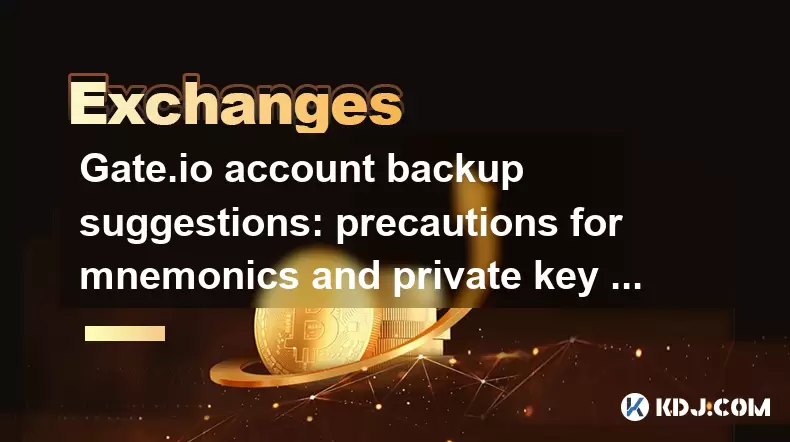
Gate.io account backup suggestions: precautions for mnemonics and private key storage
Jun 12,2025 at 10:56am
Understanding the Importance of Mnemonics and Private KeysIn the world of cryptocurrency, mnemonics and private keys are the core elements that grant users ownership over their digital assets. When using Gate.io or any other crypto exchange, understanding how to securely manage these components is crucial. A mnemonic phrase typically consists of 12 or 2...
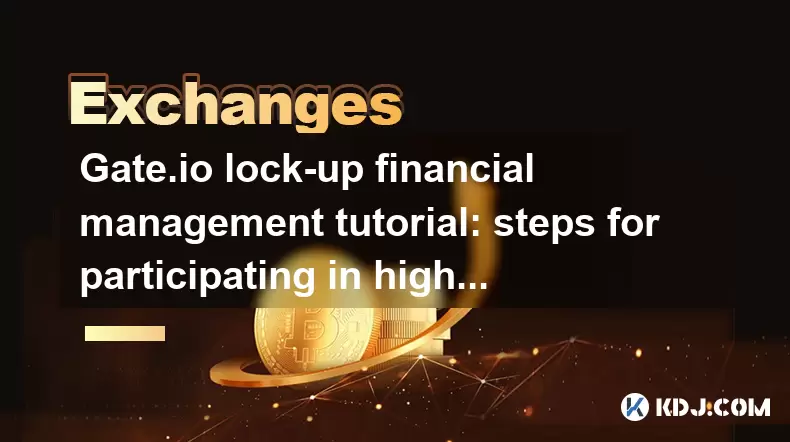
Gate.io lock-up financial management tutorial: steps for participating in high-yield projects and redemption
Jun 13,2025 at 12:43am
What Is Gate.io Lock-Up Financial Management?Gate.io is one of the world’s leading cryptocurrency exchanges, offering users a variety of financial products. Lock-up financial management refers to a type of investment product where users deposit their digital assets for a fixed period in exchange for interest or yield. These products are designed to prov...
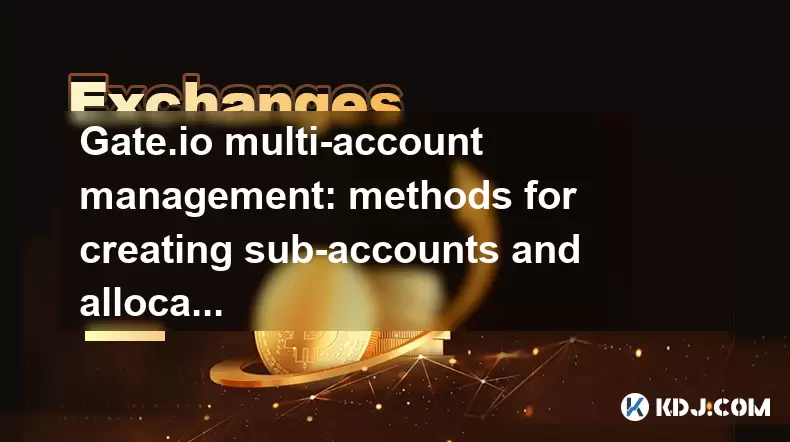
Gate.io multi-account management: methods for creating sub-accounts and allocating permissions
Jun 15,2025 at 03:42am
Creating Sub-Accounts on Gate.ioGate.io provides users with a robust multi-account management system that allows for the creation of sub-accounts under a main account. This feature is particularly useful for traders managing multiple portfolios or teams handling shared funds. To create a sub-account, log in to your Gate.io account and navigate to the 'S...
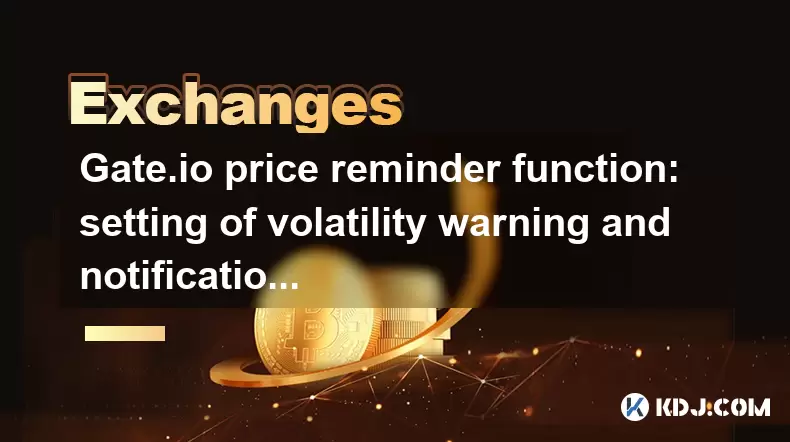
Gate.io price reminder function: setting of volatility warning and notification method
Jun 14,2025 at 06:35pm
What is the Gate.io Price Reminder Function?The Gate.io price reminder function allows users to set up custom price alerts for specific cryptocurrencies. This feature enables traders and investors to stay informed about significant price changes without constantly monitoring market data. Whether you're tracking a potential buy or sell opportunity, the p...

Gate.io trading pair management: tutorials on adding and deleting watchlists
Jun 16,2025 at 05:42am
What Is a Watchlist on Gate.io?A watchlist on Gate.io is a customizable feature that allows traders to monitor specific trading pairs without actively engaging in trades. This tool is particularly useful for users who want to track the performance of certain cryptocurrencies or trading pairs, such as BTC/USDT or ETH/BTC. By organizing frequently watched...

Gate.io DEX connection tutorial: detailed explanation of decentralized trading operation steps
Jun 12,2025 at 08:04pm
Connecting to Gate.io DEX: Understanding the BasicsBefore diving into the operational steps, it is crucial to understand what Gate.io DEX is and how it differs from centralized exchanges. Unlike traditional platforms where a central authority manages user funds and trades, Gate.io DEX operates on blockchain technology, allowing users to trade directly f...

Gate.io account backup suggestions: precautions for mnemonics and private key storage
Jun 12,2025 at 10:56am
Understanding the Importance of Mnemonics and Private KeysIn the world of cryptocurrency, mnemonics and private keys are the core elements that grant users ownership over their digital assets. When using Gate.io or any other crypto exchange, understanding how to securely manage these components is crucial. A mnemonic phrase typically consists of 12 or 2...

Gate.io lock-up financial management tutorial: steps for participating in high-yield projects and redemption
Jun 13,2025 at 12:43am
What Is Gate.io Lock-Up Financial Management?Gate.io is one of the world’s leading cryptocurrency exchanges, offering users a variety of financial products. Lock-up financial management refers to a type of investment product where users deposit their digital assets for a fixed period in exchange for interest or yield. These products are designed to prov...

Gate.io multi-account management: methods for creating sub-accounts and allocating permissions
Jun 15,2025 at 03:42am
Creating Sub-Accounts on Gate.ioGate.io provides users with a robust multi-account management system that allows for the creation of sub-accounts under a main account. This feature is particularly useful for traders managing multiple portfolios or teams handling shared funds. To create a sub-account, log in to your Gate.io account and navigate to the 'S...

Gate.io price reminder function: setting of volatility warning and notification method
Jun 14,2025 at 06:35pm
What is the Gate.io Price Reminder Function?The Gate.io price reminder function allows users to set up custom price alerts for specific cryptocurrencies. This feature enables traders and investors to stay informed about significant price changes without constantly monitoring market data. Whether you're tracking a potential buy or sell opportunity, the p...

Gate.io trading pair management: tutorials on adding and deleting watchlists
Jun 16,2025 at 05:42am
What Is a Watchlist on Gate.io?A watchlist on Gate.io is a customizable feature that allows traders to monitor specific trading pairs without actively engaging in trades. This tool is particularly useful for users who want to track the performance of certain cryptocurrencies or trading pairs, such as BTC/USDT or ETH/BTC. By organizing frequently watched...
See all articles

























































































